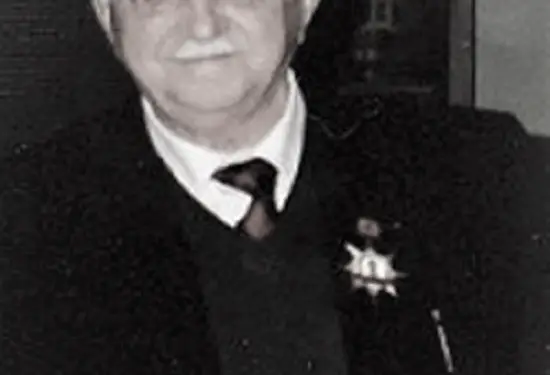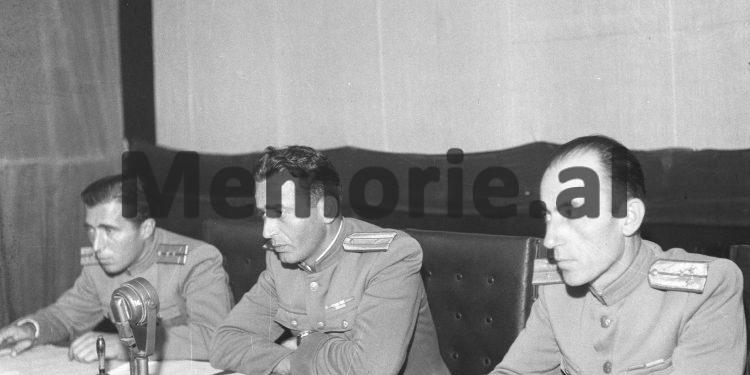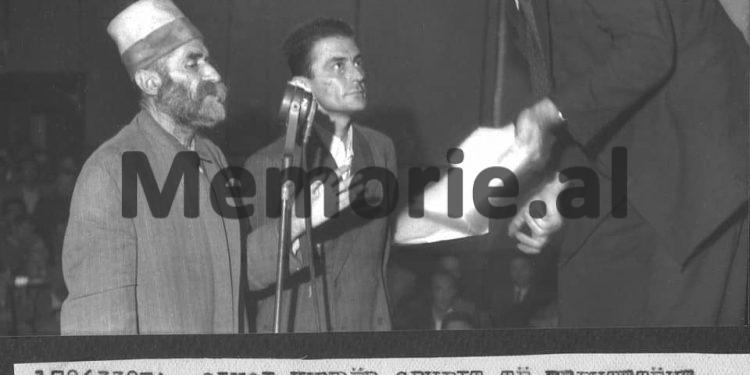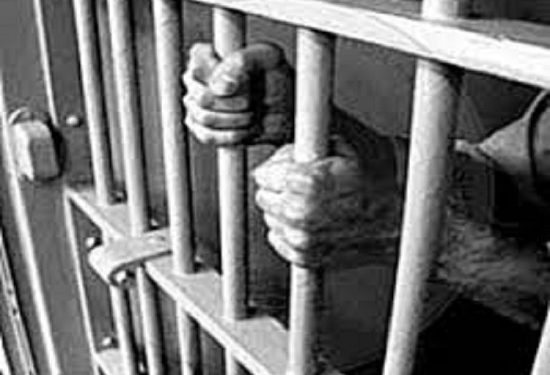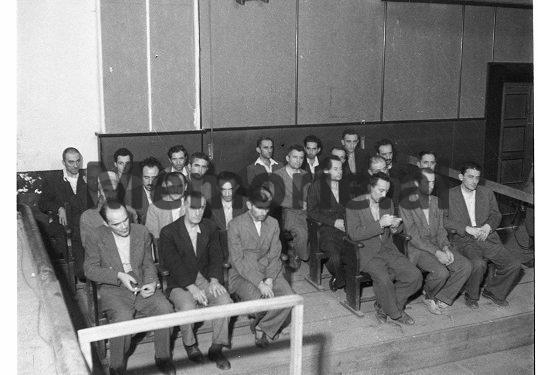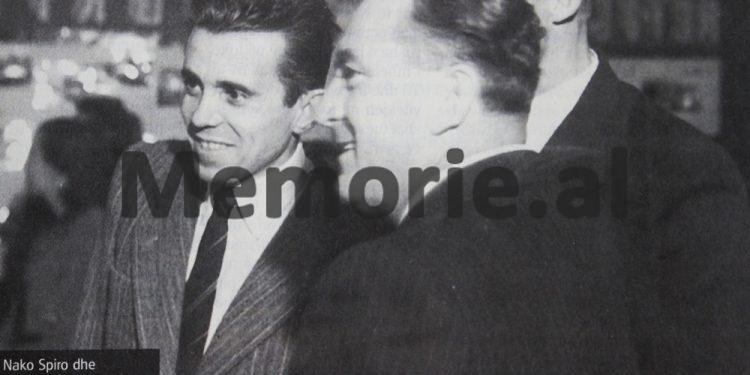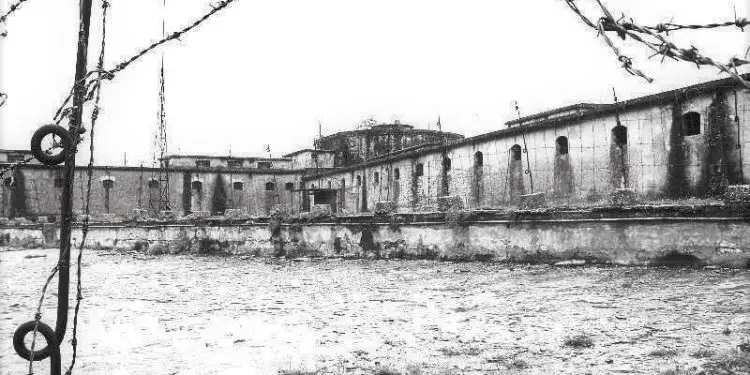By TOMOR ALIKO
-During the 50 years of the dictatorship, with mounted special trials, the brain of the Albanian nation was eliminated- These consequences are many, but the most important is: “The corruption of man, for which the former President of Czechoslovakia, Vaslav Havel, has said: “I would forgive communism everything, except the destruction of man”. –
Memorie.al / The greatest enemy of democracy is communism, therefore it is a moral obligation to shed light on the historical truth, because in every segment of it we will find heroes and fighters, who gave the most precious thing to the homeland, life, therefore with multiplied energies to strive tirelessly for the reflection of truth. Who better than us political survivors to do this! At all costs, the truth must be reflected and we must correctly and honestly tell only the truth. Albanian communism, with all the unparalleled terror, could not bring the anti-communists to their knees, who remained honorable patriots until the end of their lives. The Albanian communist crime carries on its back an infinity of crimes, where the leading role of the Communist Party stands out under the direct instructions of Enver Hoxha and his clan, who were nothing but vassals of the Yugoslavs through the so-called “fraternization” with the centuries-old enemy of our nation.
On the eve of the so-called “liberation”, when the Albanian people expected a good start, the establishment of union-fraternity and the start of democratic processes? Precisely in those days from October 28 to November 16, 1944, Tirana suddenly found itself facing mass terror. Executions began without trial against nationalists, patriots, intellectuals and former state officials. Tirana drowned in blood. By order of the commander-in-chief dictator Enver Hoxha, special partisan units were created that, with lists of “opponents” in their hands, took hostages, and killed them on the street in front of their family members. This massacre started alongside the entry of the partisan brigades into Tirana. According to the testimonies of eyewitnesses, the number of executed was more than 100 people. This was the most accurate testimony of that calvary, which baptized with blood, violence and terror the alleged tree of Albanian freedom, which for half a crazy century, would turn out to be the tree of genocide against the elite layer of Albanian society. , which over time has shown that it was a noble layer in the value system of Albanian society. Those who escaped the bullets were the first prisoners, for whom the doors of the old prison and the new prison, as well as the interrogation cells, were opened. Of course, these would also receive the punishment, some by death, and some by imprisonment.
Let’s start with the first Special Court of Tirana. On December 31, 1944, in the Old Prison of Tirana, there were more than 600 men, who were subjected to a strict investigation by investigators who came directly from the mountains. They put them on trial, a kind of “Albanian Nuremberg”, contrary to all international conventions, initiated by the winners of the Second World War. This trial took place in March-April 1945, in the hall of the former People’s Theatre. One of the most absurd and unmotivated legal trials was taking place, the echo of which would ring for a long time in the ears of Albanians, like an ominous bell, warning of future tragedies and nightmares….! The group of judges gave the sentence: “In the name of the people”, leading 17 statesmen, who had not committed any crime, except that they had been decent citizens of their country, to the mouths of fire. In the loggia of the courtroom stood himself, the guide of this macabre scenario, Enver Hoxha, surrounded by his loyal fanatics, closely observing every detail of the trial.
The jury composed of: Koçi Xoxe, chairman, lieutenant general, Hysni Kapo, member, colonel, Beqir Balluku, member, lieutenant colonel, Faik Shehu, member, lieutenant colonel, Bilbil Klosi, member, major, Medar Shtylla, member, doctor, Halim Budo, member, lawyer, Gaqo Floqi, member, lawyer and prosecutor Bedri Spahiu, sentenced by shooting: Fejzi Alizoti, Javer Hurshiti, Kol Tromara, Konstandin Kote, Hilmi Leka, Reshit Merlika, Ismail Golemi, Tahsim Bishqemi, Terenc Toçi, Zef Kadarja, Shyqyri Borshi, Beqir Valteri, Bahri Omari, Dik Cani, Aqif Përmeti, Daut Charcani and Gustav Mirdash. While the following were sentenced to heavy prison terms: Koço Kota, Ibrahim Bicaku, Xhevat Korça, Qemal Vrioni, Et’hem Cara, Xhevit Leskoviku, Jakov Mile, Ndoc Naraci, Tefik Mborja, Rrok Gera, Mihal Zallari, Koço Tasi, Akile Tasi, Fiqiri Llagami, Lazer Radi, Sami Koka, Sulejman Vuciterna, Bajram Pustina, Nedin Kokona, Refat Tartari, Bilal Nivica, Ismet Kryeziu, Sokrat Dodbiba, Shuk Gurakuqi, Refat Begolli, Anton Kozmaçi, Mihal Sherko, Rok Kolaj, Vangjel Goxhomani, Zija Bejleri , Gjergj Bubani, Isan Libohova, etc.
After the Special Trial of 1945, 3 political personalities were arrested and imprisoned, two of whom were members of the Regency in 1943-1944: Lef Nosi and Pater Anton Harapi, as well as the prime minister of that period, Malik Bushati. The three were brought to the High Military Court in January 1946 and sentenced to death by firing squad, putting them in the common pit in “Priest’s Hill”, where those shot by the Special Court of Tirana were found, April 1945.
In the years 1945-1948, Albanian nationalism suffered the most barbaric persecution that history has known. Dictator Enver Hoxha charged the Minister of the Interior of those years, General Koçi Xoxe, to carry out this mission, who, through the State Security, Police, Prosecution and Military Courts, implemented the directives of the Political Bureau for the annihilation of the nationalists Albanians. In these circumstances, opposing elements began to gather and reflect on this violent usurpation of the collective Albanian consciousness…! The reflection was the elections of December 1945. Although these elections were monitored by the Westerners and mainly by the Anglo-Americans, their freedom was drowned under the delirious noises of the state party, under police terror against elements suspected of being opponents of the regime communist. Elements from the Front of Resistance, Legality and the Social-Democrat group are picketed.
These were honest intellectuals, who loved their country differently, not with a knife behind their back, according to the Yugoslav agent style that dominated the new Albanian leadership. Names such as: Sami Qeribashi, Qenan Dibra and Musine Kokalari, were the first intellectual and political figures who opposed the dictatorship. Other intellectuals joined them, such as: Suat Asllani, Baltaz Benusi and many others. One of the most prominent oppositionists was the intellectual Gjergj Kokoshi, former Minister of Education in the First Government of Enver Hoxha, who, even though he was part of the National Liberation War, had declared in the Anti-Fascist Council: “Where there is no pluralism, there is no democracy”.
In January 1946, the State Security and other structures of the dictatorship unleashed a massive wave of arrests throughout the country. They imprisoned all the members of the “Democratic Union” in Tirana and the surrounding areas, and subjected them to the most inhumane tortures in the interrogatories, simply for the fact that they had dared, according to the Constitution, to come out in opposition to the government, which was based on violence and exclusion, fraud and demagoguery in the system.
The Supreme Military Court chaired by Frederik Nosi, (major), Veledin Hyseni and Nexhat Hyseni, member (first captain), sentenced 9 people by firing squad: Sami Qeribashi, Qenan Dibra, Xhatit Koka, Mehmet Beshiri, Mahmut Meniku, Hivzi Gole, Shaban Balla, Ali Kavaja and Talat Drini. The following were sentenced to heavy prison terms: Musine Kokalari, Gjergj Kokoshi, Suat Asllani, Baltaz Benusi, Prof. Çoka, Kol Rodhe, Nefail Shikuli, Reiz Hasho, Hasan Kalaja, Stefan Bumçi, Musa Dizdari, Llazar Papapostili, Anton Dukagjini, etc.
On November 8, 1946, on Friday, in the hall of the “Nacional” Cinema, the trial began against 16 members accused of being the “Saboteur Group” for draining the Maliqi swamp. Thus begins another cruel act of human drama with the punishment of the so-called “saboteurs”, of the drying up of the Maliq swamp. The members of this group were engineers and technicians, skilled cadres trained in the Albanian-American school of “Harry Fultz”. They were seen with a pathological fear as opponents of the communist regime. It was a carefully scripted trial, which opened in early November 1946. The “alleged” failure to drain Maliq’s swamp was the pretext and tragic backdrop against which the act of shame and punishment with life was played out of the next generation of intellectuals.
The Supreme Military Court, composed of: Lt. Col. Gaqo Floqi, Chairman and Captains, Valedin Zeneli and Neshat Hyseni, members and Prosecutors, Nevzat Haznedari, sentenced by hanging: Abdyl Sharra, engineer, Kujtim Beqiri, engineer, young hanged two times on the rope, because the first time, he escaped hanging and according to the unwritten divine laws, the person is considered innocent and his life is spared. But the bloodthirsty do not know God’s laws. By this court, the following are sentenced by shooting: Vasil Mano, engineer, Zyraka Mano, economist, his wife, pregnant, whom the dictatorship shot with the baby in her womb, Eugenio Skaturo, engineer, Italian, Mirush Përmeti, engineer. While the technicians: Hans Vala, Mario Guarnjiri, Mihal Stratobërdha, Jani Vasili, Pandeli Zografi, the Italian doctor Anastasio Ricco, etc. were sentenced to heavy prison terms.
In 1947, the Albanian communist government undertook one of its biggest reprisals, a state terror, “because a power taken by violence could not be kept otherwise, except by acts of violence”, but before the public it had to justify every punishment he carried out. Two years had passed since the parliamentary elections of 1945. In order to enable a “pluralist cover”, for the opinion, several nationalist candidates had won in these elections, such as: Shefqet Beja, Kol Kuqari, Selaudin Toto, Sheh Ibrahim Karbunara, Kosta Boshnjaku, Riza Dani, Faik Shehu, Kol Rodhe, etc., or any independent candidate.
But the demagoguery for free and independent thought would soon run out of tin….! Opposing opponents were arrested and charged with the most incredible charges of overthrowing the people’s power. The jury, composed of: Major Niko Çeta and members, captains Nexhat Hyseni, Mustafa Iljazi, with prosecutor Josif Pashko, give the sentence: Hanging on the rope: Shefqet Beja, Riza Alizoti, Sulo Klosi. By shooting: Sheh Karbunara, Enver Sazani, Selaudin Toto, Salim Kokalari, Irfan Majuni, Tefik Deliallisi, Beqir Çela, Hysen Shehu, Pertef Karagjozi, Abdyl Kokoshi, Agathokli Xhitomi, Paolo Sagiotti, Kol Kuqari and Ferit Hysenbegasi, die from torture in the investigator , while the 22-year-old young man, Muhamet Prishtina, will be sacrificed only because he was the son of the patriot Jahja Prishtina.
Sentenced to heavy imprisonment: Foto Bala, Gjovalin Vlashi, Ramazan Tabaku, Ram Marku, Irfan Pustina, Isuf Vrioni, Rustem Sharra, Sulo Konjari, Haki Karapici, Shefki Minarolli, etc. The executors of these massacres were the prosecutors: Aranit Çela, Nevzat Haznedari, Petrit Hakani, Subi Bakiri, Siri Çarçani, etc. Decisions were made “in the name of the people”, by ignorant judges, criminals Bexhet Mema, Myftar Grabocka, Njazi Meka, Abdyl Hakiu, officers who came from the mountains, who carried out the orders of the State Security.
The history of dictators has shown that, in order to justify the oppressive apparatus as a violent force, any regime needs to create enemies. When not even three months had passed since the so-called “Trial of Deputies”, on December 31, 1947, in a small hall of the Tirana Garrison, in the late hours of that dark night, the trial of Riza Dani’s group took place , without witnesses and without defense, without evidence or facts, but only the decision of the Council of the Supreme Military Court was communicated, signed by Major Niko Çeta, Chairman, First Captain, Nexhat Hyseni and Second Captain, Mustafa Iljazi, member and with the claim of the military Prosecutor, Nevzat Haznedari, First Captain. The decision is given for 19 defendants, where six will be shot, five will be sentenced to life imprisonment and the others will be sentenced to 20 years in prison. And all this was done on the basis of a follow-up memo from the investigation, completely made up and shameful slander.
Sentenced to death by firing squad: Riza Dani, Faik Shehu, Islam Radovicka, deputies of the first legislation of the People’s Assembly. Uan Filipi, Hilmi Hysi, Hasan Reçi, Syrja Selfo and Mestan Ujaniku, die in the cell.
Sentenced to life imprisonment: Kosta Boshnjaku, (MP 1945), Isuf Hysenbegasi, Hivzi Kokalari, Adem Beli, Demir Kallarati and 20 years imprisonment, Bexhet Shehu, Ibrahim Hasnaj, etc. The dictatorship state would never stop fabricating trap events to eliminate political opponents. He would use all means of violence against them to defeat them. Thus, it happened on February 19, 1951. In the yard of the Soviet Embassy, a bomb was thrown, which broke two or three windows and raised a cloud of dust, to shroud in mystery the event that was misused by the dictatorship.
That’s all it took. What happened set the state machinery in motion, especially the State Security. Mass arrests were made, trumpeting the class enemy seeking to destroy the bridges of friendship with the Soviet Union. 22 people were arrested in Tirana and brought to court behind closed doors, as “sworn enemies of the people” and of the People’s Power. The Supreme Military Court with Chairman Shuaip Panariti, lieutenant colonel, member-captain Vangjel Kocani, Nonda Papuli, member-captain, and Prosecutor, Siri Çarçani gives the decision: Death by shooting:
Sabiha Kasimati, Pjerin Guraziu, Anton Delhysa, Zyhdi Herri, Gafur Jegeni, Jonuz Kaceli, Thoma Katundi, Tefik Shehu, Gjon Temali, Fadil Dizdari, Ali Qoraliu, Qemal Kasaruho, Mehmet Shkupi, Hekuran Troka, Petro Konomi, Pandeli Nova, Niko Lezo , Haki Kodra, Reiz Selfo, Myftar Jegeni, Manush Peshkopia, Lluka Ramkovic.
But the courts of the dictatorship would not stop acting even after 1951. The dictatorship of the proletariat would constantly produce “sworn enemies”, it would not stop before any type of crime. All the events described above constitute the epicenter of a human earthquake in Albanian territory. Hundreds of thousands of human dramas would create the insurmountable class gap with the communist power.
Right begins with justice, long error becomes guilt, and conscious guilt turns into crime. The verification of history will be branded as the mother that comes out of the curse of the offended soul. The beautiful word “Liberation” had only served as a mask for an even more merciless captivity that with fratricidal violence watered the blessed Albanian land with blood. Unfortunately, until today, the problem of coping with the consequences of totalitarianism in Albanian society, as a necessity of moving forward, has not been sufficiently assessed. These consequences are many, but the most important is: “The destruction of man, about which the former President of Czechoslovakia, Havel, said that: “I would forgive communism anything, except the destruction of man.” Memorie.al




